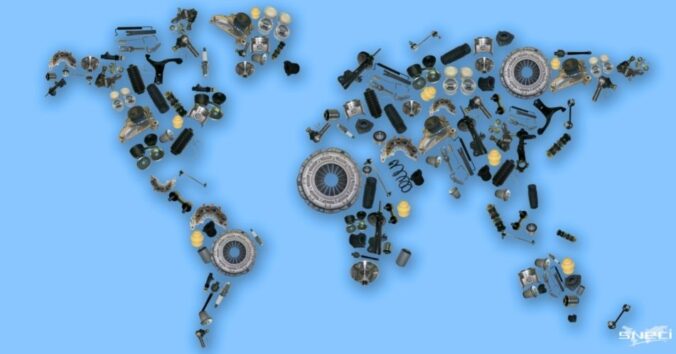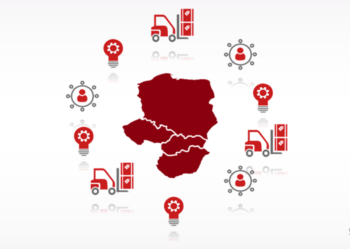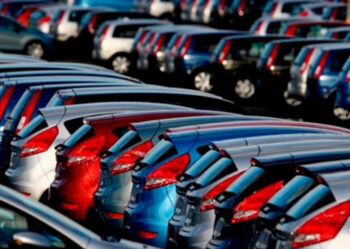The European automotive market in free fall since the beginning of 2022

The European automotive market is particularly hard hit in the first half of 2022. The semiconductor crisis, rising raw material and logistics costs, and now the conflict between Russia and Ukraine… all these factors are weighing down the automotive industry a little more each month.
Let’s take a look at the beginning of the second quarter and the consequences in Europe with a focus on Germany and Russia.
In March 2022, the automotive industry is facing a new crisis :
The invasion of Ukraine by Russia will have crystallized the crisis of the automotive market with a drop of -20.5% on the sale of new vehicles for the European market. In the first quarter of 2022, the European automotive market is down 10.6% compared to the same period last year,
With the exception of a few countries that were spared, all European countries experienced a significant drop in registrations, and for most of them it was a double-digit decline.
According to ACEA – the European Automobile Manufacturers Association – 844,147 units were sold in March 2022 representing -20.5% compared to March 2021, and even -51% compared to March 2019
Putting aside 2020 and the pandemic-related paralysis of the economies, never before have sales volumes for a month of March been so low and for comparison, the first quarter of 2021 had a dramatic jump of 62.7% compared to the same month in 2020.
In the first quarter of 2022, registrations were down 12.3% compared to the first quarter of 2021 with 2,245,976 new passenger vehicles sold.
More globally, with a 2.4% decline in January and 5.4% in February, the entire European automotive market (European Union + United Kingdom, Switzerland, Norway and Iceland) suffered a 20.5% drop in March 2022, with a total of 1,127,077 registrations (a deficit of 260,908 units compared to March 2021).
Unsurprisingly, the markets that are the most affected are :
- -39.5% for Sweden – the country with the largest decline
- -30.2% for Spain
- -29.7% for Italy
- -19.5% for France
- -17.5% for Germany
- -14.3% for Great Britain
On the manufacturer side, it is the Volkswagen group that is suffering the greatest decline with a drop in registrations of 25%. For its part, Skoda has suffered a major setback with a drop of 33.8%.
Audi resists a little more with a drop of -10% and Porsche is doing well with an increase of 13.6%.
For its part, the French manufacturer Stellantis shows a decline of -30.3% cut as follows:
- -31.3% for Peugeot
- -28.7% for Opel
- -30.5% for Citroën
- -32.8% for Fiat
DS posted a good +22.3% alongside KIA with +21.6%, Dacia with +17.9% and Honda with +7.2%.
The brands with the most registrations without a strong increase in March 2022 are :
- Volkswagen: 103,180 registrations
- Toyota: 69,827 registrations
- Audi: 65,247 registrations
- Mercedes-Benz: 65,486 registrations
- BMW: 64,158 registrations
In summary, in a market that fell by 10.6% overall in the first quarter of 2022, the Volkswagen and Stellantis groups saw their registrations fall by 15.4% and 21.7% respectively, and lost 1.4 and 2.7 points of market share.
Renault Group did slightly better than the European market with a -6.7% drop and a 0.4 point loss of market share. The Hyundai Group, on the other hand, posted an increase of +21.3% and a gain of 2.6 points in one year.
We thought March would be the worst month but April arrived with a historic drop, unheard of for the automotive sector.
April 2022 at its lowest :
A historic drop in April with only 684,000 new vehicles registered on European soil bringing the fall of this sector to 20.6%.
According to ACEA (European Automobive Manufacturers Association) figures, 684,000 vehicles were registered in Europe, and the crisis in the semiconductor industry, combined with an increasingly complex and difficult supply chain, has caused delays and even stoppages.
The main markets affected are :
- Italy with a 33% decline
- Belgium with – 23.6%
- France with – 22.6%
- Germany with -21.5%
- Spain with -12.1%
- Great Britain with -15.8%
It is historic, the European market has just experienced the four worst months in its history (forgetting 2020) with 2.9 million vehicles sold, a decline of -14.4% over one year.
The European and American automotive markets are facing major difficulties in terms of logistics, shortages and increases in materials, however ACEA was forecasting a rebound for the second half of the year, but the conflict in Ukraine has reversed the situation, making this optimistic outlook even more complex.
However, despite a falling market, some carmakers did make a profit in the first quarter thanks to higher car prices, although sales figures fell considerably in April :
- Volkswagen fell by 28% year-on-year due to the decline of its main brand, Skoda and Seat.
- Stellantis lost 31% due to significant declines at Peugeot and Opel-Vauxhall
- The Renault group recorded -16.3% with a market share of over 10%.
- BMW-Mini down 17.6%
- Toyota down 7.4%
- Mercedes by 22.6%
Only the Korean group Hyundai-Kia continues to grow on the European market with a +13.2% increase.
Difficulties that reinforce the crisis:
In addition to the crisis related to the shortage of semiconductors, the war in Ukraine and the factory closures aggravate the situation since, remember, Ukraine is the main supplier of wiring harnesses. The war further complicates the delivery problems that had already persisted since the spring of 2021.
Because of these various shortages and logistical problems, several European automotive factories have seen their production temporarily interrupted, like some German sites of the Volkswagen group. The latter has had to put its historic Wolfsburg plant and its electric vehicle production center in Zwickau on hold for some time. In France, it is the Renault factory in Douai, which produces the electric Mégane, which had to be stopped 11 days.
On the German side, the federation of German manufacturers (VDA) has revised its production forecasts for 2022 downwards to 3.3 million units produced and an increase of 7% against 13% expected.
Moreover, Hildegard Müller, president of the VDA, fears that the expansion of sanctions against Russia and production interruptions in China may have other, more consequential impacts. These interruptions are related to the containment of cities like Shanghai due to the zero-Covid strategy. As a result, new adjustments may be necessary in the coming months.
Conflict impact
Russia has not been spared either. New car sales fell by 78.5% in April, with only 32,706 registrations recorded. This decline occurred under the effect of high inflation and the heavy Western sanctions against Moscow for its offensive in Ukraine.
The heavy sanctions imposed on Russia are not without consequences as the exports of spare parts to Russia are banned from European countries. Many producers have announced the stop of the sale of components or cars to Russia as Audi, Honda, Jaguar or Porsche. Other manufacturers have announced to stop production such as Renault, BMW, Ford, Hyundai, Mercedes, Volkswagen or Volvo.
Moreover, with inflation and the instability of the ruble, the possibilities for Russians to buy imported products, especially cars, are reduced. Avtovaz, which is part of the Renault-Nissan group and is the first car producer in Russia, had to send its employees on paid leave for three weeks at the beginning of April. This action resulted in the halt of most of its production.
However, Russia does not intend to stop there. In fact, at the beginning of May, it published a list of a hundred categories of goods. Importation without the agreement of the intellectual property owners is authorized in order to circumvent the restrictions. Among these products, we find the major car brands and spare parts
European automotive market is not the only one impacted:
Greater China is particularly impacted this first half of 2022. The various confinements related to the zero-Covid policy require significant adjustments. This situation results in a lower forecast compared to market expectations. It shows a decline of 401,734 units or -1.63% compared to the previous month.
Next, the Japan/Korea zone posted a drop of 124,988 units, representing a decrease of 1.1%. Similarly, South America posted a drop of 55,287 units, reflecting a decline of 1.93%.
The Middle East/Africa region recorded -33,453 units, down -1.44%. Similarly, North America posted -6,537 units, down -0.04%. These figures are dragging down the forecasts.
Overall, Europe remains the most affected region of the world. However, the entire world is feeling the full impact of the crisis in the automotive sector.
How to face all these difficulties thanks to SNECI?
The European automotive industry has to face many challenges at the same time. These challenges include structural, cyclical, economic, societal, and environmental factors. The timing exacerbates the situation, making it more and more tense.
Manufacturers and suppliers face challenges on multiple fronts. The Covid crisis continues, alongside a shortage of semiconductors and other complex components. These issues are exacerbated by challenges related to electrification and reducing the carbon footprint. Furthermore, the crisis in Ukraine adds another layer of complexity, leaving limited leeways for manufacturers and suppliers.
However, we can support you at SNECI, we have 70 years of industrial excellence in 50 countries through business development and industrial performance improvement.
Specifically, in business development, we work on market studies and strategy consulting. Additionally, we conduct partner and financing research. Moreover, we specialize in international business development by setting up a local sales, project, quality, and logistics team.
Industrial support by SNECI
In industrial performance, we support you with purchasing, optimization, and logistics management solutions. Additionally, we manage complex projects such as dismantling, transfer, and launching of production lines. This includes a share of reengineering and optimization of production lines.
Our experts can assist you with audits that meet international standards, manufacturer standards, and industry standards. Additionally, we can customize audits through our ISA© auditing tool to provide a specific and tailored approach.
Our training and coaching offers are comprehensive. They allow us to have a complete approach for professionals of the subsidiary. Training is one of the keys to better prepare for the future.
Finally, our sorting and rework department is highly efficient. It allows us to intervene in less than 2 hours in 14 countries. We specialize in setting up quality walls.
Relocating suppliers is a specialty of SNECI. Managing all or part of your supply chain has no secrets for us. Don’t wait any longer. Entrust us with your projects. Our 450 experts are located in 50 countries. They will offer you an agile, local, efficient, and profitable approach. We are well aware that cost rationalization is even more important in times of crisis.
If you wish to be accompanied by our experts, do not hesitate to contact us by email info@sneci.com to contact us directly via the contact tab of our website.





